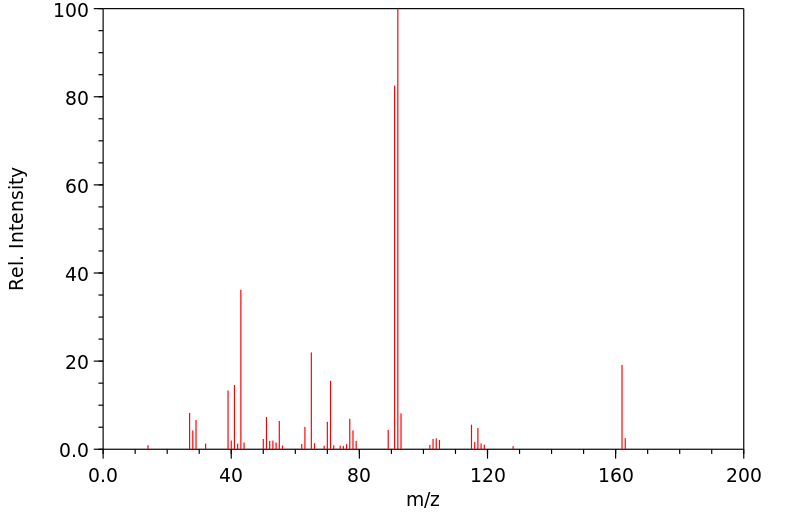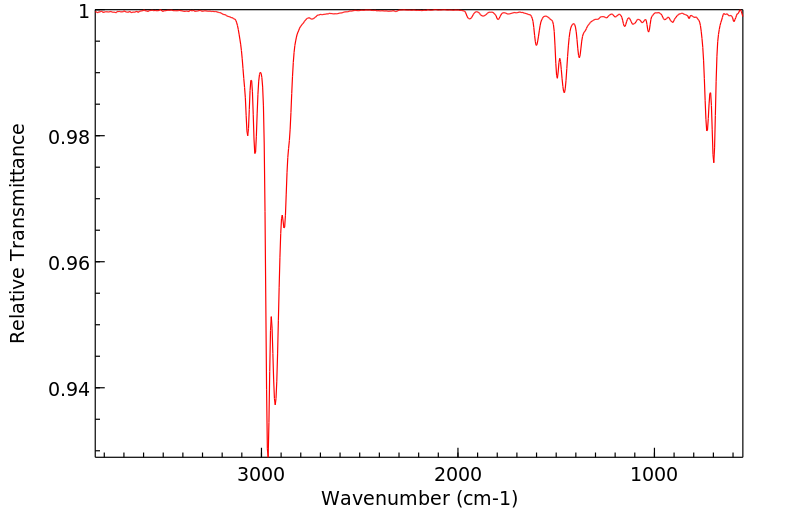(2-甲基戊基)苯 | 39916-61-5
中文名称
(2-甲基戊基)苯
中文别名
——
英文名称
2-Benzyl-pentan
英文别名
(2-Methylpentyl)benzene;2-methylpentylbenzene
CAS
39916-61-5
化学式
C12H18
mdl
MFCD00049126
分子量
162.275
InChiKey
LFBQYMCKHGBSJY-UHFFFAOYSA-N
BEILSTEIN
——
EINECS
——
-
物化性质
-
计算性质
-
ADMET
-
安全信息
-
SDS
-
制备方法与用途
-
上下游信息
-
文献信息
-
表征谱图
-
同类化合物
-
相关功能分类
-
相关结构分类
物化性质
-
保留指数:1191;1191;1196;1205.2
计算性质
-
辛醇/水分配系数(LogP):4.6
-
重原子数:12
-
可旋转键数:4
-
环数:1.0
-
sp3杂化的碳原子比例:0.5
-
拓扑面积:0
-
氢给体数:0
-
氢受体数:0
安全信息
-
海关编码:2902909090
SDS
上下游信息
-
上游原料
中文名称 英文名称 CAS号 化学式 分子量 —— α-Methyl-propyl-benzeneethanol 54518-11-5 C12H18O 178.274 2-甲基-1-苯基-1-戊醇 2-methyl-1-phenyl-1-pentanol 73177-67-0 C12H18O 178.274
反应信息
-
作为反应物:描述:(2-甲基戊基)苯 在 chlorosulphuric acid 作用下, 生成 4-(2-methyl-pentyl)-benzenesulfonic acid amide参考文献:名称:死Strukturformel DES第三人以elektrochemische Reduktion冯甲基苄基acetessigester gewonnenen KohlenwasserstoffsÇ 12 ħ 18(塔菲尔“血清胆碱酯酶Umlagerung III)摘要:DOI:10.1002/hlca.193702001119
-
作为产物:描述:参考文献:名称:死Strukturformel DES第三人以elektrochemische Reduktion冯甲基苄基acetessigester gewonnenen KohlenwasserstoffsÇ 12 ħ 18(塔菲尔“血清胆碱酯酶Umlagerung III)摘要:DOI:10.1002/hlca.193702001119
文献信息
-
Chemistry of bivalent carbon intermediates—IV作者:C.D. Gutsche、G.L. Bachman、R.S. CoffeyDOI:10.1016/s0040-4020(01)92713-9日期:1962.1By means of competition experiments phenylcarbene, generated from phenyldiazomethane, has been shown to be approximately equally reactive to the benzene ring (to form phenylcycloheptatriene) and to aliphatic CH2 bonds, to be approximately six times more reactive to aliphatic CH2 bonds than to aliphatic CH2 bonds, and to be very unreactive toward aromatic CH bonds. These data have been used as aids
-
Factors Affecting Heavy-Duty Diesel Vehicle Emissions作者:Nigel N. Clark、Justin M. Kern、Christopher M. Atkinson、Ralph D. NineDOI:10.1080/10473289.2002.10470755日期:2002.1Societal and governmental pressures to reduce diesel exhaust emissions are reflected in the existing and projected future heavy-duty certification standards of these emissions. Various factors affect the amount of emissions produced by a heterogeneous charge diesel engine in any given situation, but these are poorly quantified in the existing literature. The parameters that most heavily affect the emissions from compression ignition engine-powered vehicles include vehicle class and weight, driving cycle, vehicle vocation, fuel type, engine exhaust aftertreatment, vehicle age, and the terrain traveled. In addition, engine control effects (such as injection timing strategies) on measured emissions can be significant. Knowing the effect of each aspect of engine and vehicle operation on the emissions from diesel engines is useful in determining methods for reducing these emissions and in assessing the need for improvement in inventory models. The effects of each of these aspects have been quantified in this paper to provide an estimate of the impact each one has on the emissions of diesel engines.
-
High Pressure Thermal Alkylation of Monoalkylbenzenes by Simple Olefins<sup>1</sup>作者:Herman Pines、Joseph T. ArrigoDOI:10.1021/ja01575a036日期:1957.9
-
Enantioselective Carbometalation of Cinnamyl Derivatives: New Access to Chiral Disubstituted Cyclopropanes— Configurational Stability of Benzylic Organozinc Halides作者:Stephanie Norsikian、Ilan Marek、Sophie Klein、Jean F. Poisson、Jean F. NormantDOI:10.1002/(sici)1521-3765(19990702)5:7<2055::aid-chem2055>3.0.co;2-9日期:1999.7.2
-
Alkylation-reduction of carbonyl systems. IV. Convenient and selective synthesis of simple and complex aromatic hydrocarbons by phenylation-reduction of aldehydes and ketones作者:Stan S. Hall、Frank J. McEnroeDOI:10.1021/jo00891a001日期:1975.2
表征谱图
-
氢谱1HNMR
-
质谱MS
-
碳谱13CNMR
-
红外IR
-
拉曼Raman
-
峰位数据
-
峰位匹配
-
表征信息
同类化合物
(βS)-β-氨基-4-(4-羟基苯氧基)-3,5-二碘苯甲丙醇
(S,S)-邻甲苯基-DIPAMP
(S)-(-)-7'-〔4(S)-(苄基)恶唑-2-基]-7-二(3,5-二-叔丁基苯基)膦基-2,2',3,3'-四氢-1,1-螺二氢茚
(S)-盐酸沙丁胺醇
(S)-3-(叔丁基)-4-(2,6-二甲氧基苯基)-2,3-二氢苯并[d][1,3]氧磷杂环戊二烯
(S)-2,2'-双[双(3,5-三氟甲基苯基)膦基]-4,4',6,6'-四甲氧基联苯
(S)-1-[3,5-双(三氟甲基)苯基]-3-[1-(二甲基氨基)-3-甲基丁烷-2-基]硫脲
(R)富马酸托特罗定
(R)-(-)-盐酸尼古地平
(R)-(-)-4,12-双(二苯基膦基)[2.2]对环芳烷(1,5环辛二烯)铑(I)四氟硼酸盐
(R)-(+)-7-双(3,5-二叔丁基苯基)膦基7''-[((6-甲基吡啶-2-基甲基)氨基]-2,2'',3,3''-四氢-1,1''-螺双茚满
(R)-(+)-7-双(3,5-二叔丁基苯基)膦基7''-[(4-叔丁基吡啶-2-基甲基)氨基]-2,2'',3,3''-四氢-1,1''-螺双茚满
(R)-(+)-7-双(3,5-二叔丁基苯基)膦基7''-[(3-甲基吡啶-2-基甲基)氨基]-2,2'',3,3''-四氢-1,1''-螺双茚满
(R)-(+)-4,7-双(3,5-二-叔丁基苯基)膦基-7“-[(吡啶-2-基甲基)氨基]-2,2”,3,3'-四氢1,1'-螺二茚满
(R)-3-(叔丁基)-4-(2,6-二苯氧基苯基)-2,3-二氢苯并[d][1,3]氧杂磷杂环戊烯
(R)-2-[((二苯基膦基)甲基]吡咯烷
(R)-1-[3,5-双(三氟甲基)苯基]-3-[1-(二甲基氨基)-3-甲基丁烷-2-基]硫脲
(N-(4-甲氧基苯基)-N-甲基-3-(1-哌啶基)丙-2-烯酰胺)
(5-溴-2-羟基苯基)-4-氯苯甲酮
(5-溴-2-氯苯基)(4-羟基苯基)甲酮
(5-氧代-3-苯基-2,5-二氢-1,2,3,4-oxatriazol-3-鎓)
(4S,5R)-4-甲基-5-苯基-1,2,3-氧代噻唑烷-2,2-二氧化物-3-羧酸叔丁酯
(4S,4''S)-2,2''-亚环戊基双[4,5-二氢-4-(苯甲基)恶唑]
(4-溴苯基)-[2-氟-4-[6-[甲基(丙-2-烯基)氨基]己氧基]苯基]甲酮
(4-丁氧基苯甲基)三苯基溴化磷
(3aR,8aR)-(-)-4,4,8,8-四(3,5-二甲基苯基)四氢-2,2-二甲基-6-苯基-1,3-二氧戊环[4,5-e]二恶唑磷
(3aR,6aS)-5-氧代六氢环戊基[c]吡咯-2(1H)-羧酸酯
(2Z)-3-[[(4-氯苯基)氨基]-2-氰基丙烯酸乙酯
(2S,3S,5S)-5-(叔丁氧基甲酰氨基)-2-(N-5-噻唑基-甲氧羰基)氨基-1,6-二苯基-3-羟基己烷
(2S,2''S,3S,3''S)-3,3''-二叔丁基-4,4''-双(2,6-二甲氧基苯基)-2,2'',3,3''-四氢-2,2''-联苯并[d][1,3]氧杂磷杂戊环
(2S)-(-)-2-{[[[[3,5-双(氟代甲基)苯基]氨基]硫代甲基]氨基}-N-(二苯基甲基)-N,3,3-三甲基丁酰胺
(2S)-2-[[[[[((1S,2S)-2-氨基环己基]氨基]硫代甲基]氨基]-N-(二苯甲基)-N,3,3-三甲基丁酰胺
(2S)-2-[[[[[[((1R,2R)-2-氨基环己基]氨基]硫代甲基]氨基]-N-(二苯甲基)-N,3,3-三甲基丁酰胺
(2-硝基苯基)磷酸三酰胺
(2,6-二氯苯基)乙酰氯
(2,3-二甲氧基-5-甲基苯基)硼酸
(1S,2S,3S,5S)-5-叠氮基-3-(苯基甲氧基)-2-[(苯基甲氧基)甲基]环戊醇
(1S,2S,3R,5R)-2-(苄氧基)甲基-6-氧杂双环[3.1.0]己-3-醇
(1-(4-氟苯基)环丙基)甲胺盐酸盐
(1-(3-溴苯基)环丁基)甲胺盐酸盐
(1-(2-氯苯基)环丁基)甲胺盐酸盐
(1-(2-氟苯基)环丙基)甲胺盐酸盐
(1-(2,6-二氟苯基)环丙基)甲胺盐酸盐
(-)-去甲基西布曲明
龙蒿油
龙胆酸钠
龙胆酸叔丁酯
龙胆酸
龙胆紫-d6
龙胆紫









